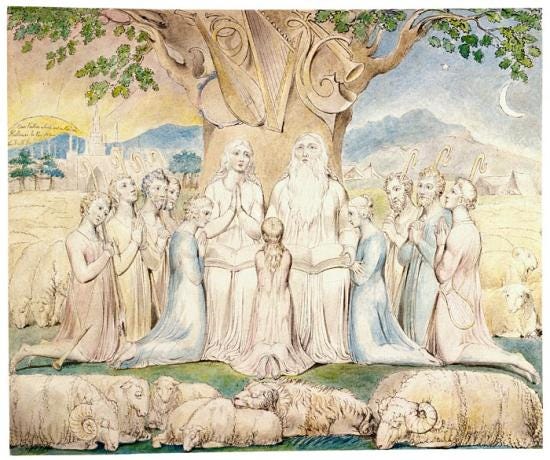On Rereading the Book of Job
The first time I read the Book of Job, I was a nineteen-year-old in my first year at university. I was just starting to become interested in Christianity again after abandoning my Italian Catholic background for the best part of my teenage years, when I found Job on the list of my required reading. Although the class I was taking was one meant to introduce first-years to the Bible as literature, the professor who gave the lecture on Job was first and foremost a Romanticist by training. He was a brilliant lecturer, an experienced poet, and a committed teacher; his classes on William Wordsworth were the highlight of my final year of university, and he was dearly missed by the department when he passed away. Still, he had his limitations. He saw Shakespeare, Milton, and yes, even the Bible, through the lens of William Blake’s unorthodox religious beliefs, and so in his lecture on the Book of Job he highlighted Job’s anger over his eventual reconciliation with God, his indignation at what he perceived as God’s punishment over his enduring love of God. At one point - and to be fair to this professor, I cannot recall if this was his own characterisation, or if he was quoting someone else’s opinion - the word ‘megalomaniac’ was used to refer to God.
God, a megalomaniac? I remember being a little shocked by this. Although I had called myself an atheist for years, I retained from my childhood a fear of speaking insultingly of God. And now that I was returning to the faith, I couldn’t understand how the takeaway of the Book of Job could be that God is a power-hungry tyrant, when I found it to be such a consoling story. I had extreme youth on my side and, to be perfectly honest, I had never experienced anything painful enough in my life to understand how someone could justify Job’s embitterment and defend him against God’s providence. I was courageous and naïve. It’s a special time in one’s life when suffering doesn’t scare us; unfortunately, it doesn’t tend to last.
Now, I am not claiming to be that much older and certainly not much wiser than I was back then, but a few years have passed, and a lot of painful things have now happened to me. Without divulging too much about my personal or professional life, during the Covid-19 pandemic I encountered a succession of painful disappointments, no matter how hard I worked, no matter how much I tried to be a ‘good’ person. I started to understand a little of Job’s anger. I was doing everything right, so why was everything going wrong? I too, had finally experienced Job’s embitterment of heart.
But three years ago I wasn’t married and I didn’t have children. I could not yet understand how much more momentous the loss of a spouse or children is than anything that had ‘gone wrong’ in my life so far. So, when I reread the Book of Job very recently, I finally felt like I properly understood his character and his interactions with God. Although I have been fortunate enough to have had a healthy child - and another healthy baby currently in utero - I can now understand the fear of anything happening to either my husband or my children. It is a maddening fear. If anything ever did happen to them, I would no doubt struggle with God in anger, just as Job does.
But while during the pandemic I experienced an aimless sort of anger that pushed me away from my faith, I now see that anger and hope can go hand-in-hand. For the first time, when I went through a very trying time in my life recently, I felt both extreme frustration at God, and an extreme desire to rely on His love. I prayed that my anger would go away, while knowing that that very anger was a normal response to suffering, and that God can make use of that anger. As Cardinal John Henry Newman wrote in one of his prayers,
I will trust Him; whatever I am, I can never be thrown away. If I am in sickness, my sickness may serve Him, in perplexity, my perplexity may serve Him. If I am in sorrow, my sorrow may serve Him. He does nothing in vain. He knows what He is about. He may take away my friends. He may throw me among strangers. He may make me feel desolate, make my spirits sink, hide my future from me. Still, He knows what He is about.
If every time I’ve read Job has been so different, I dare say in five, ten, or thirty years from now it will bring consolation or spur reflection in yet a different way. It is one of those books in the Bible whose meaning deepens, and whose significance strikes me at moments of great change in my life. Somehow, it always offers exactly what is needed. It may be one of the bleakest books in the Bible, but it is one I will return to again and again. As Newman writes, and as Job learns, God knows what He is about.



It's a been a good long while since I read Job. This essay has inspired me to read it again and read it deeply.
There must be something that inspires deep thinking. After all, in the period of one year John Calvin preached 159 sermons on Job. And his sermons were not short.
Thank you for the essay.